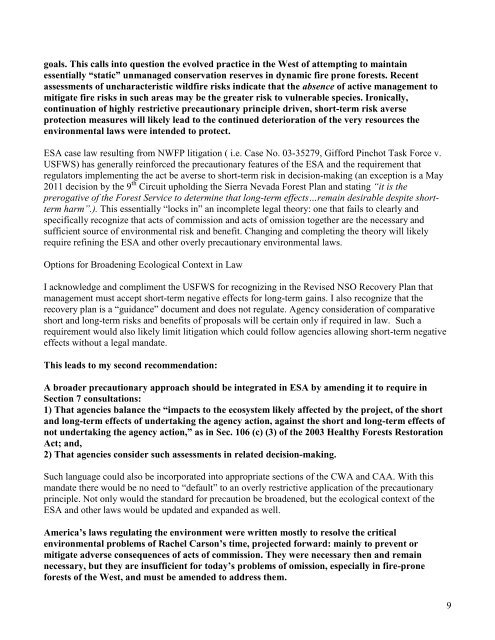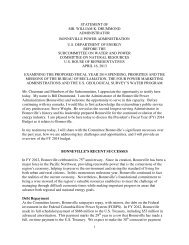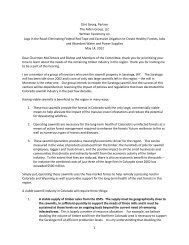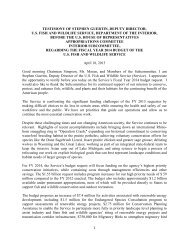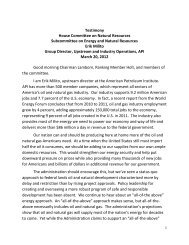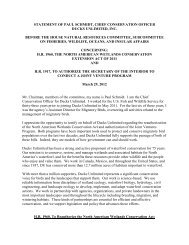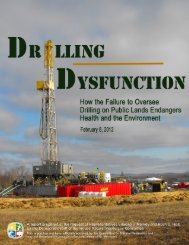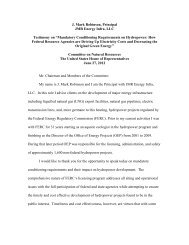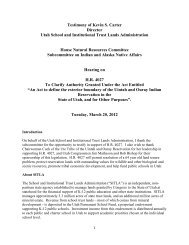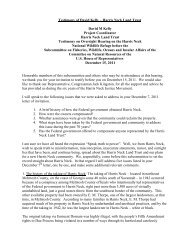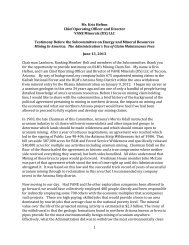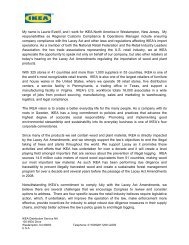Mr. Stephen Mealey - The House Committee on Natural Resources ...
Mr. Stephen Mealey - The House Committee on Natural Resources ...
Mr. Stephen Mealey - The House Committee on Natural Resources ...
Create successful ePaper yourself
Turn your PDF publications into a flip-book with our unique Google optimized e-Paper software.
goals. This calls into questi<strong>on</strong> the evolved practice in the West of attempting to maintain<br />
essentially “static” unmanaged c<strong>on</strong>servati<strong>on</strong> reserves in dynamic fire pr<strong>on</strong>e forests. Recent<br />
assessments of uncharacteristic wildfire risks indicate that the absence of active management to<br />
mitigate fire risks in such areas may be the greater risk to vulnerable species. Ir<strong>on</strong>ically,<br />
c<strong>on</strong>tinuati<strong>on</strong> of highly restrictive precauti<strong>on</strong>ary principle driven, short-term risk averse<br />
protecti<strong>on</strong> measures will likely lead to the c<strong>on</strong>tinued deteriorati<strong>on</strong> of the very resources the<br />
envir<strong>on</strong>mental laws were intended to protect.<br />
ESA case law resulting from NWFP litigati<strong>on</strong> ( i.e. Case No. 03-35279, Gifford Pinchot Task Force v.<br />
USFWS) has generally reinforced the precauti<strong>on</strong>ary features of the ESA and the requirement that<br />
regulators implementing the act be averse to short-term risk in decisi<strong>on</strong>-making (an excepti<strong>on</strong> is a May<br />
2011 decisi<strong>on</strong> by the 9 th Circuit upholding the Sierra Nevada Forest Plan and stating “it is the<br />
prerogative of the Forest Service to determine that l<strong>on</strong>g-term effects…remain desirable despite shortterm<br />
harm”.). This essentially “locks in” an incomplete legal theory: <strong>on</strong>e that fails to clearly and<br />
specifically recognize that acts of commissi<strong>on</strong> and acts of omissi<strong>on</strong> together are the necessary and<br />
sufficient source of envir<strong>on</strong>mental risk and benefit. Changing and completing the theory will likely<br />
require refining the ESA and other overly precauti<strong>on</strong>ary envir<strong>on</strong>mental laws.<br />
Opti<strong>on</strong>s for Broadening Ecological C<strong>on</strong>text in Law<br />
I acknowledge and compliment the USFWS for recognizing in the Revised NSO Recovery Plan that<br />
management must accept short-term negative effects for l<strong>on</strong>g-term gains. I also recognize that the<br />
recovery plan is a “guidance” document and does not regulate. Agency c<strong>on</strong>siderati<strong>on</strong> of comparative<br />
short and l<strong>on</strong>g-term risks and benefits of proposals will be certain <strong>on</strong>ly if required in law. Such a<br />
requirement would also likely limit litigati<strong>on</strong> which could follow agencies allowing short-term negative<br />
effects without a legal mandate.<br />
This leads to my sec<strong>on</strong>d recommendati<strong>on</strong>:<br />
A broader precauti<strong>on</strong>ary approach should be integrated in ESA by amending it to require in<br />
Secti<strong>on</strong> 7 c<strong>on</strong>sultati<strong>on</strong>s:<br />
1) That agencies balance the “impacts to the ecosystem likely affected by the project, of the short<br />
and l<strong>on</strong>g-term effects of undertaking the agency acti<strong>on</strong>, against the short and l<strong>on</strong>g-term effects of<br />
not undertaking the agency acti<strong>on</strong>,” as in Sec. 106 (c) (3) of the 2003 Healthy Forests Restorati<strong>on</strong><br />
Act; and,<br />
2) That agencies c<strong>on</strong>sider such assessments in related decisi<strong>on</strong>-making.<br />
Such language could also be incorporated into appropriate secti<strong>on</strong>s of the CWA and CAA. With this<br />
mandate there would be no need to “default” to an overly restrictive applicati<strong>on</strong> of the precauti<strong>on</strong>ary<br />
principle. Not <strong>on</strong>ly would the standard for precauti<strong>on</strong> be broadened, but the ecological c<strong>on</strong>text of the<br />
ESA and other laws would be updated and expanded as well.<br />
America’s laws regulating the envir<strong>on</strong>ment were written mostly to resolve the critical<br />
envir<strong>on</strong>mental problems of Rachel Cars<strong>on</strong>’s time, projected forward: mainly to prevent or<br />
mitigate adverse c<strong>on</strong>sequences of acts of commissi<strong>on</strong>. <str<strong>on</strong>g>The</str<strong>on</strong>g>y were necessary then and remain<br />
necessary, but they are insufficient for today’s problems of omissi<strong>on</strong>, especially in fire-pr<strong>on</strong>e<br />
forests of the West, and must be amended to address them.<br />
9


